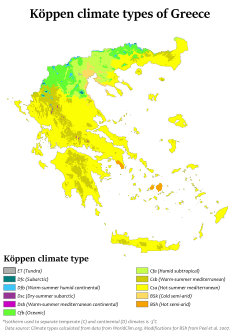
Back مناخ اليونان Arabic Κλίμα της Ελλάδας Greek Kreikan ilmasto Finnish Görögország éghajlata Hungarian 그리스의 기후 Korean Клімат Греції Ukrainian

The climate in Greece is predominantly Mediterranean. However, due to the country's geography, Greece has a wide range of micro-climates and local variations. The Greek mainland is extremely mountainous, making Greece one of the most mountainous countries in Europe.[1][2] To the west of the Pindus mountain range, the climate is generally wetter and has some maritime features. The east of the Pindus mountain range is generally drier and windier in summer. The highest peak is Mount Olympus, 2,918 metres (9,573 ft).[3] The northern areas of Greece have a transitional climate between the continental, the Mediterranean and the humid subtropical climate. There are mountainous areas that have an alpine climate. Also, various areas of Greece have semi-arid climates.[4][5]
- ^ "Climatology,HNMS, Hellenic National Meteorological Service". www.hnms.gr. Retrieved 14 July 2020.
- ^ "Visit Greece | Geography". Visit Greece | The Official website of the Greek Tourism Organisation. Retrieved 14 July 2020.
- ^ "Olympus the First National Park". Management Agency of Olympus National Park. 2008. Archived from the original on 14 January 2017. Retrieved 5 December 2015.
- ^ "Climate Atlas of Greece" (PDF). Hellenic National Meteorological Service. Archived from the original on 21 September 2017. Retrieved 30 December 2019.
- ^ "Monthly Bulletins". www.meteo.gr.